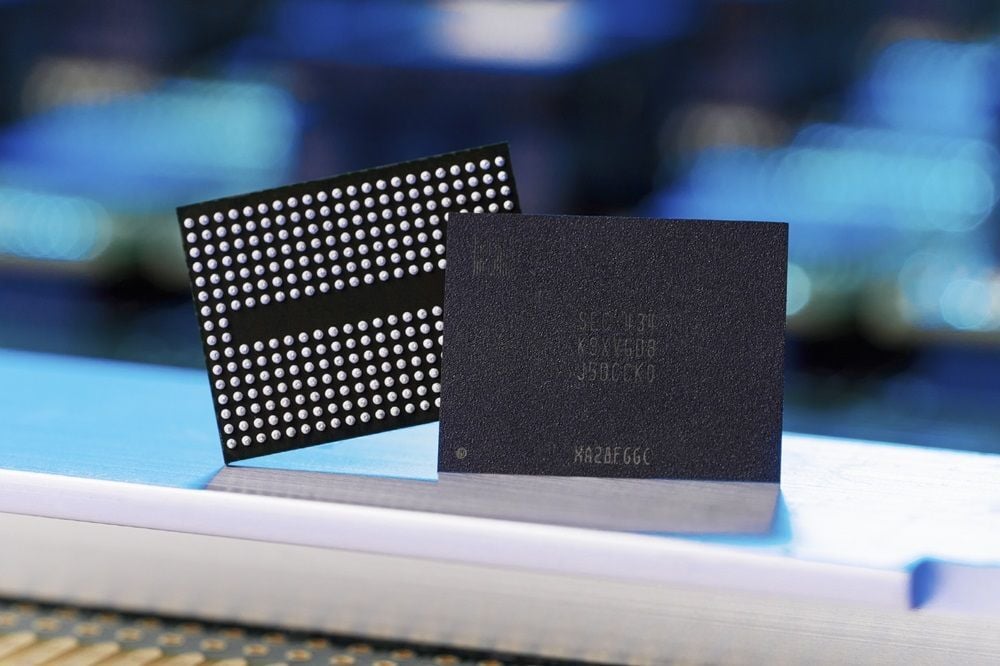And Apple will finally sell the iPhone starting with 256GB
Technically the Pro Max already starts at 256 GB (starting with the 15 series iirc). But they simply removed the 128 GB option from the price stack.
Yet apple will still charge $200 for 128gb
It’s almost as if oligopolies can manipulate prices regardless of availability
32 level “PLC” cells, OMG. How about staying at levels with some durability.
Amazing news! Unfortunately, if this comes to Brazil and 8tb SSD would be the price of a car
That makes cars very cheap or technology very expensive
Or both extremely expensive.
What do they cost you now?
R$ 5.460,00 (Brazilian Reais), the first comment is just exaggerating and having a ‘mongrel complex’ take. It is nowhere near the price of a car even today.
In freedom units, that looks to be ~$1k for 8TB SSD. Same device here is $600-700.
So, not that much more expensive, i bet west european countries get near or equal that price, it’s electronics in the US that are cheaper than others (including rich countries). and it’s more that we are poor.
That’s decently more expensive! $300-700 difference is pretty significant imo. Like I couldn’t swing that I don’t think, pushes it too expensive
It could also be a difference in how sales tax or whatever is presented. I know in the EU, VAT is included in online pricing, whereas sales tax in the US is not. I don’t know how Brazil runs things, but that could explain a chunk of the difference. The US also likely has higher volume for these kinds of things, so prices will likely be lower in the US than Brazil.
But yeah, it looks to be about 40-50% more expensive, which is substantial. If you’re looking to spend $600-700 on storage, there’s a good chance you can afford another $300-400, you just don’t want to spend that much.
Brazilian system is the most simple: It is already the final price (not counting shipping, which might be many options), with EVERY tax included. Period. What i see is what i pay. Even Aliexpress shows numbers with all taxes included in the final total price now.
The Yankee system is honestly both insane and fraudulent, nothing is ever the price that the webpages or stickers show, i always have to guess it’s somewhere between 10% and 20% more. The european system is also more honest, unless they also have other taxes besides VAT that they don’t show.
They already exist. $dayjob bought some 64GB ssds. They were about $7500USD per drive.
For 64gb? Did you mean tb or is there something unique about these drives?
Good news but it’ll be a while before I can replace the 20TB drives in my NAS with these.
You would replace your NAS drives with SSDs?
Im not super experienced with NAS and only started home networking like three years ago. but I read SSDs would die quicker than traditional disks.
I’m not sure although it’s mostly used for media storage so there aren’t a lot of write operations. Having said that I do have solid state M2 drives in there for caching with no issues so far.
More density means less longevity, less write cycles before the blocks wear out, also decreases the time before Nand leakage can end up corrupting the data. Doesn’t seem like a good thing to me.
Oh yeah, also more storage space causes complacency with developers who will terribly optimize their games because they don’t have to worry about games not fitting on people’s disks. Think 100GB games is bad it’ll get much worse when they got more free space at their disposal, and worse, the perception that their customers have tons of free space as well.
I don’t disagree with you, but on the other hand, this will be a huge boon for people who do things like sail the high seas and wish to keep what they acquire long term. You’re not constantly rewriting in those cases. You’re just slowly (or perhaps not so slowly) filling up the drive. Eventually, it’s essentially read only.
Considering how much I spent on 6 TB of regular hard drive storage for this reason a few years ago, I’d be all for affordable 8 TB SSDs.
sail the high seas
You don’t need solid state storage for Linux ISOs
I recently bought a 5TB hard drive. It’s funny how that sounds like a lot of space until you fill it up and find yourself eyeing another.
Yep, I can’t afford any more storage. I’ve had to start curating and weeding, which is a shame because I know there are things I’d probably eventually revisit. Oh well. So long, Duckman.
if I may ask, what kinds of things are you storing? my computer has only 500gb, my phone has 128gb, and I pay a small fee for 100gb of cloud storage for photos. sometimes I feel like I’m running out of space but it’s never a real problem for me. so I’m just curious because I’m having trouble imagining what I’d even fill up 5tb with.
I’m the person in the thread before the person who asked, but I’m in the same boat. In my case: videos, radio shows and comics.
A 4-season TV series in 1080p can easily take up 50-100 gb.
ah that makes sense. thanks
My iCloud Photos is 1.2TB
Admittedly I should prune junk out, but RAW photos from real cameras are big and I’m not giving them up. Same with videos from my DJI.
I mean, you’re not wrong but I eventually bought all that shit I torrented in college on gog or steam when I got a job
There are plenty of games that you can’t buy on Gog or Steam even today (like any emulation ISO from console games), and sharing is caring for others that can not afford it.
I’m talking about things like movies and TV shows, not games. In fact, if you aren’t careful (or just have a game that doesn’t allow you to choose where it saves its data), you could have the write cycle issue with games.
Thinking about it, it would be nice if when formatting a partition on mlc based drives, you could specify the number of bits per cell used. So an 8tb QLC drive could be formatted as a 2tb SLC for those who want the resilience, without having to commit to it permanently.
I’m sure there are technical reasons that would be difficult, but everything started out difficult until we figured it out.
Large game file size is an optimization
Excellent, I needed more space for cookies, malware and games that suddenly require 500GB of free space. I’ll have that thing full in no time.
I’ll believe it when I see it. 4TB SSDs are still not affordable.
I’m all for it, and it’s just the usual “moores law” trend, I just wonder if we won’t hit a wall where (most!) users just won’t need it?
The issue is, every time we make a great leap in storage medium, we tend to use that new storage for BIGGER files. Higher quality media and all that. Back in the day, the average movie file was measured in the MB. Now it’s GB. Think about an old floppy with 1.4 MB of data and how many text files you stored on it. You couldn’t ever imagine needing more space. Then came pictures and music files. Video files. Then higher resolution picture and video files. Suddenly even your text documents aren’t just raw .txt files, but Word documents and interactive PDFs.
As storage improves, what we expect to be able to carry around with us or have in our home computer changes. I’m currently running a home server with 18TB of storage. An amount that I would have never dreamed of possessing 20 years ago, and yet here I am debating when I grab that 24TB drive because I can already see me running out of space in a few months.
This is all to say that I really don’t think there will ever be a maximum amount a user could need. Give them that maximum and in a week they’ll have figured out a way to use it to capacity. I think video games and cartridge/disk size limitations and then the transition to digital games and balloning game size shows my point.
This demand is also dictated by what companies see as a default setup, now it’s 0,5Tb+ SSDs as syst drives. W10\11 doesn’t work on HDDs because their update and security services can overwhelm your disk’s speed and make the system unresponsive. If you are given an older hardware by your employer, good luck, as your OS and other programs assume they don’t need to limit either speed or size, and the only way to keep using the same features is to upgrade.
Exactly. Eventually what we see now as cutting edge will become “bare minimum” or even “obsolete” hardware one day. Eventually the camera on your cell phone will by default be taking such high resolution pictures that anything less that a TB of onboard storage will seem quaint.
Our family’s first proper PC back in around ‘93 had a 1gb HDD. I remember strutting about at school like I was the top shit because of how great my computer was.
These days I have a modded iPod mini with 128gb that I’m getting close to needing to increase because of my love of 320kbps MP4 files.
We’ve already hit a perceived user experience limit. The perception of responsiveness in blind tests between SATA and NVMe SSDs isn’t always apparent–people sometimes say the SATA drive is faster–even though the speed difference on paper is substantial.
IMO, programmers haven’t exploited the possibilities of extremely fast mass storage yet. The orders of magnitude difference in speed isn’t fully realized. It’s not just faster, it’s faster in a way that requires new approaches. Unlike multicore CPUs over a decade ago, this change in thinking has gone relatively unnoticed by programmers.
Well maybe, it’s just storage like HD or RAM.
But to do what (outside scientific software)?
Make everything faster. Space that isn’t used for caching data is space that’s wasted.
This isn’t necessarily about apps that run on your desktop or phone. Most code in the world runs on servers, and the use cases are different.
I’m already avoiding buying newer SSDs because the durability is dropping off a cliff.
I’m really scared of them cramming more and more bits in the same cell. Every time they double that number it’s got to be cutting the write longevity in half. Unless they’ve got some other thing they can do to increase that.
TLC or bust for me.
I’d only consider QLC for low write high read situations like a NAS that serves as media storage.
Yeah, density isn’t really an issue IMO, I want reliable, cheap, and fast, in that order, yet SSDs seem to be going for dense, fast, and cheap, with little thought for long-term reliability.
I’m sure we will get some “random” fire at some factory to drive prices up again.
That’s likely the point where spinning platters die in the marketplace.
Right now, spinning platters are around $12/tb. SSDs are around $75. Exact numbers fluctuate with features and market changes, but those are the ballpark. Cut in half, SSDs will be $38/tb, and then $19 in the next halving. Spinning platters aren’t likely to see the same level of reduction in that time period; they’re a mature technology.
I think once they reach double the price per tb, we’ll see a major collapse of the hard drive market. My thinking is that there’s a lot of four drive RAID 10 systems out there. With SSDs, those can be two drive RAID 1, and will still be faster. With half the drives, they can be twice the price and work out the same.
Spinning platters are already dead in many ways because even though they’ve increased in capacity, they haven’t meanigfully changed read/write speeds in decades, which makes moving the ever increasing data a huge pain.
Not really relevant, but I just moved 150ish GB between SSDs in a few minutes, less than 5 for sure. As a teenager such an operation (moving 3 games between drives) would have taken an hour. As a kid I’d be furiously changing floppy drives all day.
I just thought that was an interesting thought.
This is it. Yes, spinning HDDs may be cheaper, but replacing mine with an SSD made my PC faster and quieter, especially on boot.
are HDDs finally dying?
Not yet, unless the higher capacity comes at a much lower price. HDDs are fine for the price currently
it’ll be interesting to see what happens, but i’ve been hoping that at some point SSDs will simply hit a cost point that is lower, whereas HDDs won’t be able to go below that (due to physical tolerancing and complicated manufacturing) whereas with an SSD it’s literally just chips on a board. You put more of them on the board it has more storage, simple as that.
Although i think before that, HDDs would likely become extremely competitive since they would actually be forced to lower cost some substantial amount.
Although i think before that, HDDs would likely become extremely competitive since they would actually be forced to lower cost some substantial amount.
I think you have it backwards. The SSD manufacturers are always going to see their product as better than HDD performance wise so they’ll likely always have a higher price per capacity.
that’s possible, but idk. I don’t really see why i would want an 8TB ssd that can run at 4GB/s unless im literally a data center, so i think at some point the higher capacity ones are just going to have to be cheaper and more affordable. I.E. probably slower.
Yup, I use HDDs for my NAS and SSDs for my desktop and laptop. HDD for cheap storage, SSD for fast storage.
Not when 20TB drives are becoming cheaper :)
oh shit, you might be right, this might actually make HDDs more affordable as flash starts to catch up.
I doubt it will be this much. But at least it could lower the price, assuming it’s not already a thin margin for the manufacturers, and they will instead resort to using SMR instead of CMR
High capacity SMR drives are already a special hell, those wont get much market share for the average HDD use case outside of archival usage, which might be the intent to begin with lol. I believe SMR drives are already cheaper anyway, not sure how much that is due to R&D and production or just existing in a special market space right now, but it’s one of them.
nar. HDDs don’t require power to maintain their state. So that’s an advantage they’ll always have over SSDs, which means there will be use-cases where HDDs are the better choice.
HDDs don’t require power to maintain their state. So that’s an advantage they’ll always have over SSDs
SSDs are not flash memory.
might wanna make sure they have sufficient emf shielding
daamn 1 TB in 2029 now ay
This is per chip. A given NVMe drive usually contains multiple chips.


















